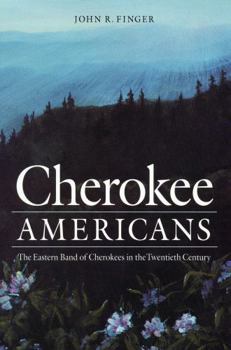Cherokee Americans: The Eastern Band of Cherokees in the Twentieth Century
Select Format
Select Condition 
Book Overview
Cherokee Americans combines . . . high-quality scholarship and eminent readability.―Choice Much has been written about the forced removal of thousands of Cherokee Indians to present-day Oklahoma in the 1830s. Many of them died on the Trail of Tears. But until recently historians have largely ignored the tribal remnant that avoided removal and remained in North Carolina. John R. Finger shifts attention to the Eastern...
Format:Paperback
Language:English
ISBN:0803268793
ISBN13:9780803268791
Release Date:February 1993
Publisher:Bison Books
Length:248 Pages
Weight:1.05 lbs.
Dimensions:0.6" x 5.9" x 8.9"
Customer Reviews
1 rating
Good, readable history of the Eastern Band
Published by Thriftbooks.com User , 17 years ago
This book provides a history of the Eastern Band of Cherokees over the last century. While many have told the story of the Trail of Tears, few have checked back with the much smaller group of Cherokee who managed to stay in North Carolina. Finger's book provides a valuable and sizeable part of that history. He relies significantly on oral histories, capturing these voices before they disappear. Of course, this reliance on insider perspectives also limits his history as the interaction of outsiders with the tribe is minimized. Because the Eastern Band is very heavily intermarried with non-Cherokee, oral histories of those people who retain the strongest affiliation with the tribe also tends to downplay the stories of those of only quarter or eighth Cherokee blood. While he discusses some of the resulting internal divisions in the tribe, he tends not to obtain the views of those who left the area for one reason or another. Many parts of this story would be interesting for other parts of twentieth-century southern history. For example, the role of Indians in the Jim Crow period and civil rights movement is not at all visible, but it should be. The Cherokee had a very ambiguous status in the North Carolina's system of apartheid. Despite being classified as citizens for the purposes of being drafted in World War I, Cherokee men were classified as non-citizens for the purpose of voting. This may reflect racism, of course, but it may also reflect the strong connection between the Cherokee band and the Republican Party, a connection they shared with other mountain people. Finger does discuss one important outside influence on the Band, the Great Smoky Mountains National Park. He provides balanced assessment of advantages and disadvantages of the national park for the Eastern Band, which has one of the highest income levels of any Indian reservation. At the same time, contact with tourists has worn down the traditional culture of the Cherokee, and has essentially eliminated the language. Despite some of the limitations mentioned above, this is a very interesting and fair-minded account of the Eastern Band in the twentieth century. I recommend it for those with an interest in Native Americans, North Carolina, and/or the Great Smoky Mountains.






